Halden Surname Ancestry ResultsOur indexes 1000-1999 include entries for the spelling 'halden'. In the period you have requested, we have the following 94 records (displaying 11 to 20): Single Surname Subscription | | | Buying all 94 results of this search individually would cost £476.00. But you can have free access to all 94 records for a year, to view, to save and print, for £100. Save £376.00. More... |
These sample scans are from the original record. You will get scans of the full pages or articles where the surname you searched for has been found. Your web browser may prevent the sample windows from opening; in this case please change your browser settings to allow pop-up windows from this site. Inhabitants of the city of Oxford
(1380)
The poll tax granted in 1379 was assessed and raised in the following two years. Every lay person, man or woman, aged over 15 was to be taxed. The returns for the city of Oxford, edited by J. E. Thorold Rogers, were printed for the Oxford Historical Society in 1891.HALDEN. Cost: £4.00.  | Sample scan, click to enlarge
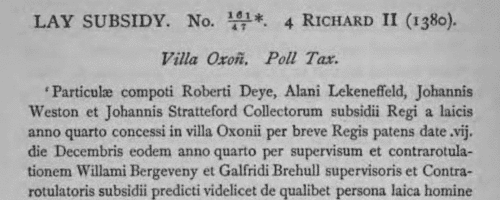
| Fine Rolls
(1377-1383)
The fine rolls of the 1st to 6th years of the reign of king Richard II record part of the government administration in England, with orders sent out day by day to individual officers, and commitment of particular responsibilities and duties. There is also some material relating to Wales, Scotland, Ireland and the English possessions in France. HALDEN. Cost: £4.00.  | Sample scan, click to enlarge

| Landowners and tenants in Kent
(1345-1485)
Inquisitions ad quod damnum were held by the appropriate sheriff or escheator (or other officer in whose bailiwick the matter in question might lie) to investigate cases in which the royal or public interest might be damaged by proposed alienation or settlement of land (especially alienation to religious uses, into mortmain). The key findings from these inquisitions were as to the tenure of the land and the service due from it; its yearly value; the lands remaining to the grantor, and whether they sufficed to discharge all duties and customs due from him; and whether he can still be put upon juries, assizes and recognitions, so that the country be not burdened by his withdrawal from them. Generally speaking, this process had the makings of a system of licensing such alienations, and raising money in proportion to the valuations. Equally, there are many items that deal with subjects such as the closing of public roads, the felling or inclosing of woods, or the proposed grant of liberties or immunities. A calendar of these inquisitions from the 19th year of the reign of king Edward III to the 2nd year of Richard III was prepared by the Public Record Office and published in 1906. We have now indexed this calendar by surname and county. Most of the individuals appearing in the calendar are either pious individuals seeking to make grants to religious bodies for the sake of their souls; or landowners securing the disposition and settling of their real estate. But some other names do appear - tenants, trustees, chaplains and clerks.HALDEN. Cost: £6.00.  | Sample scan, click to enlarge
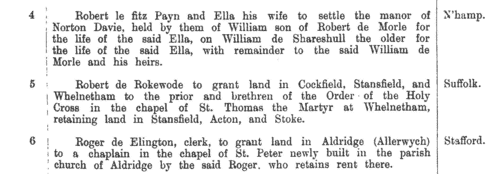
| Servants of the Scottish crown
(1473-1498)
Under the direction of the Lord Clerk Register of Scotland, the earliest Accounts of the Lord High Treasurer of Scotland, under the series Compota Thesauriorum Regum Scotorum, were abridged and published. This first volume, prepared by Thomas Dickson, curator of the Historical Department of the General Register House, was published in 1877. It contains the earliest surving accounts, from 1473 to 1474 in the reign of king James III, and the next, from 1488 to 1489 in the reign of king James IV. These were printed verbatim; but there then follow (page 166 onwards) accounts through to 1498 'considerably curtailed by the omission of unimportant entries'. These accounts are mostly lists of royal expenditure: many purchases of items for the court do not give the name of the merchants from whom they were bought, so the bulk of the personal names in the text are those of intermediaries, messengers, and various servants of the king.HALDEN. Cost: £4.00.  | Sample scan, click to enlarge
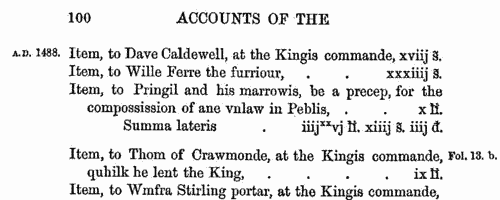
| Penshurst Manuscripts
(1150-1580)
C. L. Kingsford prepared a calendar of the papers of Lord de L'Isle and Dudley at Penshurst Place in Kent for the Historical Manuscripts Commission, of which this first volume was published in 1925. The material is presented in eleven sections: I. 39 deeds relating to the Sydney family's Surrey and Sussex estates from about 1150 to 1502; II. Summary notes on deeds from these and other English counties (mainly Essex, Kent, Lincolnshire and Yorkshire) and from Wales and Ireland; III. Documents relating to Robertsbridge Abbey in Sussex (charters and deeds; rentals; court rolls; reeve's accounts at Footland; and bursar's accounts) from 1160 onwards; IV. Deeds and documents relating to the church and college of Tattershall in Lincolnshire (deeds; statutes and ordinances; miscellaneous papers; court rolls; and accounts (warden's, steward's, precentor's and impositor's, receiver's, bailiffs', and building and post-dissolution accounts); V. Family papers and estates accounts of the Cromwells of Tattershall (general accounts and wills; accounts of stewards of the household; building accounts of Tattershall castle; estate accounts); VI. Summary lists of various rolls, rentals, surveys and accounts, from various counties (mainly Kent and Lincolnshire); VII. Documents relating to Penshurst and its owners; VIII. Sydney family papers; IX. Accounts of the ironworks at Robertsbridge and in Glamorgan; X. Papers relating to the Council of Wales, 1526 to 1580; and XI. Irish Accounts, from sir Henry Sydney's terms as Vice-Treasurer and Lord Deputy of Ireland, 1556 to 1578.HALDEN. Cost: £4.00.  | Sample scan, click to enlarge

| Scottish litigants, rebels and cautioners
(1610-1613)
The Privy Council of Scotland exercised a superior judicial authority in the kingdom, and consequently received and dealt with a constant stream of petitions, as well as dealing with the internal security of the state. This register of the council from July 1610 to February 1613, in the reign of king James VI, was edited by David Masson and published under the direction of the Deputy Clerk Register of Scotland in 1889. The publication starts with the Acta and Decreta, a chronological consolidation of material from Acta Secreti Concilii proper, the Decreta, the Book of Commissions, the Book of Sederunts, the Minute Book of Processes, and The Book of the Isles. There is then a section of Royal and Other Letters (pp. 565-644); then acts and bands (bonds) of caution (surety) from the registers called Acta Cautionis (pp. 647-690); and Miscellaneous Privy Council Papers (693-746). Many of the individuals mentioned are the complainants, those of whom they complained, and the sureties on both sides: at this period, many of the complainants are alleging serious attacks, often of a feuding nature. Many of the bonds entered into by the cautioners are promises to keep the peace towards such enemies. Failure to answer to the council when summoned was a serious contempt, leading to being denounced a rebel, with serious consequences.
HALDEN. Cost: £4.00.  | Sample scan, click to enlarge

| Lancashire and Cheshire Marriage Licences
(1606-1616)
Licences for intended marriages in Chester archdeaconry, which covered Cheshire and Lancashire south of the Ribble (by far the most populous part of that county)HALDEN. Cost: £4.00.  | Sample scan, click to enlarge

| Inhabitants of Cambridge
(1504-1635)
Cambridge comprised fourteen ancient parishes, plus the university (which was extra-parochial), in the diocese of Ely. The church of St Mary the Great (as opposed to St Mary the Less) in the Market Place (juxta forum) has churchwardens' accounts surviving from 1504 onwards. Those from 1504 to 1635 were transcribed by J. E. Foster for the Cambridge Antiquarian Society and published in 1905. The two churchwardens were chosen annually: the previous year's churchwardens each chose another parishioner: those two then each chose three other parishioners: the resulting eight then chose the new year's churchwardens, the wardens of the Light of the Rood, and the wardens of the Mass of Jesus. Auditors were also chosen, usually out of the eight, to examine all the wardens' accounts at the end of the year. The churchwardens' accounts are largely concerned with the costs of repair of the church and its furnishings, and include the names of tradesmen and workmen. Each Easter a rate called Easter money was raised was raised from all householders in the parish, and additional rates are occasionally levied for unusual expenses, such as steeple reconstruction. These 'Easter book' lists give a complete list of householders for the parish, excepting the poor. The church's income also included the rents from some houses in the parish, and the names of the tenants appear. The offices of the Light of the Rood and the Mass of Jesus were abolished during the Reformation. The accounts of the Light of the Rood, i. e., for candles burnt before the crucifix, often include a list of sums received for funerary diriges (dirges) for the year, from which the year of death of the more prosperous parishioners can be traced in this early period. HALDEN. Cost: £4.00.  | Sample scan, click to enlarge

| PCC Probates and Administrations
(1649)
The Prerogative Court of Canterbury's main jurisdiction was central and southern England and Wales, as well as over sailors &c dying abroad: these brief abstracts, compiled under the title "Year Books of Probates", and printed in 1906, usually give address, date of probate and name of executor or administrator. They are based on the Probate Act Books, cross-checked with the original wills, from which additional details are, occasionally, added. The original spelling of surnames was retained, but christian and place names have been modernised where necessary.HALDEN. Cost: £2.00.  | Sample scan, click to enlarge
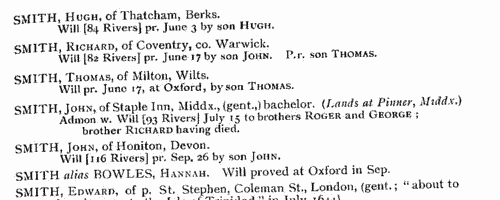
| Hertfordshire Sessions
(1619-1657)
Incidents from the Hertfordshire Sessions Books and Sessions Minute Books. These cover a wide range of criminal and civil business for the county.HALDEN. Cost: £4.00.  | Sample scan, click to enlarge
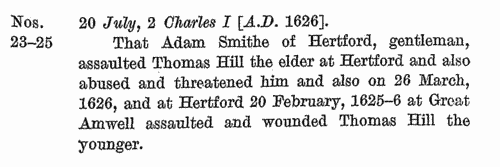
|
Research your ancestry, family history, genealogy and one-name study by direct access to original records and archives indexed by surname.
|












